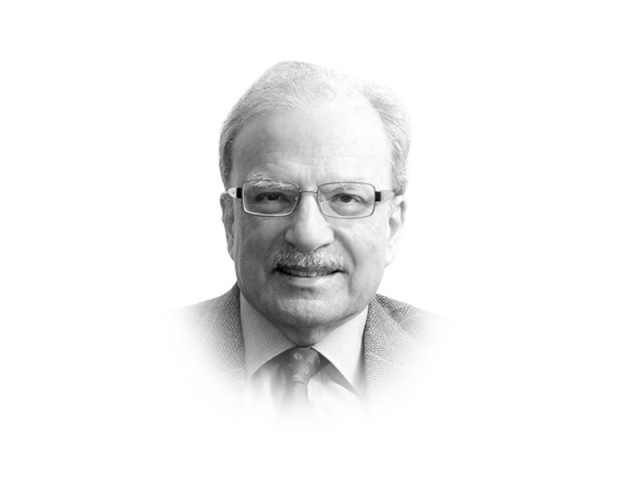Islamabad’s indifference towards global issues
Policymakers are oblivious to the fact that the global economic and political order is being slowly reshaped.

Islamabad’s indifference towards global issues
Pakistan’s policymakers should be concerned that their country has been totally excluded from the deliberations that are currently going on to construct a new — or to reshape the old — global and economic and political order. I find it quite extraordinary, and somewhat disturbing, that the Pakistani media, both the print and electronic versions, gave so little attention to the New Delhi summit of the BRICS (Brazil, Russia, India, China, South Africa) nations. The meeting was held in New Delhi on March 29 when Prime Minister Yousaf Raza Gilani was meeting with important political leaders, heads of the armed forces, and the chief of the main intelligence agency to fashion a new relationship with the US. That meeting appropriately received full media coverage. But the media did not seem too interested in the summit of the five heads of states of the BRICS nations next door in New Delhi.
Hosted by the Indian Prime Minister Dr Manmohan Singh, the BRICS summit discussed a number of issues that should also be of immediate concern for Islamabad and Pakistan’s informed citizenry. That apparently is not the case. One reason why Pakistan is treated with such little respect is that it has made very little effort to get involved in global economic and political matters. There is a lesson to be learned from the way Turkey has positioned itself on the global stage. It was not a very long time ago that Ankara was totally ignored by the international community. Now it is represented effectively in a number of different forums.
The New Delhi meeting was the fourth time that the BRICS leaders have met. The first meeting was held in Russia in 2009. This time around they took up a number of matters on which they believe a collective decision would have a greater impact than acting alone. One of the issues taken up, on which no definitive stance was adopted, was about the restructuring of the institutional structure that supports the old global economic order. They want their countries to have a greater say in the way these institutions are managed and make their policies. Both the IMF and the World Bank are important for Pakistan. The country leans on the former during difficult times. It relies on the latter all the time for development assistance. Not only has Islamabad not taken much interest in the way these institutions are likely to evolve to maintain their relevance in a rapidly changing global economy, the country also has extremely weak official representation in these two institutions.
The BRICS nations have expressed some interest in creating a development bank of their own. If established, this new financial institution will draw its capital from the developing world. All the BRICS nations have large external account balances. China now holds the world’s largest foreign exchange reserves. If it decides to create a World Bank type-of-institution, it will have no problem finding capital for it. The institution might not be able to rival the World Bank in terms of access to resources but it could certainly acquire the significance that the Asian Development Bank enjoys. It should be of interest to Pakistan to keep a watch over the working of the process that might eventually lead to the establishment of a BRICS bank. How will such an institution be managed; who will have access to its resources and how will that access be determined; what will be its lending policies; how will it deal with other development institutions? These are some of the questions that will be raised and when the answers are found, they would serve the interests of the founding members and other developing nations. Is there some ministry or government institution in Pakistan that is concerned with such issues? The answer is, probably not.
Do we, in Pakistan, know that James O’Neill, the author of the BRICS idea has now come up with another suggestion? He believes that the world would do well to watch the progress being made by another group of countries he calls the “new eleven”. This group includes Pakistan along with more dynamic, emerging economies such as Argentina, Indonesia, Mexico, South Korea, and Turkey. These countries have either the demographic size (for instance Indonesia, Mexico and Turkey) or high rates of economic growth (for instance South Korea and Turkey) that will have considerable influence on the working of the global economy. If that idea is picked up, would it also lead to the development of an institutional device or a forum where these countries can actively pursue their interests?
The main conclusion I want to draw from this discussion is that Pakistan’s policymakers are so absorbed in dealing with a rapidly deteriorating domestic situation, that they have not turned their attention towards the way the global system is being reshaped. Islamabad may assign a low priority to what is happening to the economic world some distance away from its borders. This will prove to be costly neglect. We must operate in a system in which we have a voice and a role in developing it. This is not the case at this time. Unless we change our priorities we will be functioning in an environment that will remain hostile towards us, and in which our position will be increasingly uncomfortable.
Published in The Express Tribune, April 9th, 2012.













COMMENTS
Comments are moderated and generally will be posted if they are on-topic and not abusive.
For more information, please see our Comments FAQ